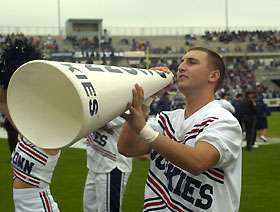|
This is an archived article.
For the latest news, go to the
Advance Homepage
For more archives, go to the Advance Archive/Search Page. | ||
|
Center Helps Level Playing Field Gary Johnson stands, arms outstretched, ready to catch his cheerleading partner as she jumps. An inch either way and she could slip through his hands. But he catches her, and deftly places her on the turf of UConn's new Rentschler Field.
Johnson is a member of the Husky cheerleading squad for football and men's basketball. He's a dual major in psychology and communication s disorders with a 3.2 GPA, and holds two part-time jobs on campus. He's also legally blind.
Active Participation "I do anything anyone else can do; I just have to work a little harder," he says. Johnson has some vision, but can't read writing on the board. Each semester, with help from the Center for Students with Disabilities (CSD), he asks his professors for certain accommodations, such as extra time for taking tests, and the help of a note-taker if the class involves a lot of work on the board. Through the CSD, too, he orders large print books, or books in electronic format. He can use a regular computer to read electronic materials, but sets the font large or zooms in on the text. Sometimes the center hires students to record books on tape for him. He says studying from tapes takes him more time than it takes other students to read printed books, because he has to listen to every word. But he has developed a strategy that helps: using a special speed control feature on his tape recorder, he can speed up the tape and he has learned to understand accelerated speech. Johnson, who works at the CSD answering questions from students and parents about the services available, says UConn has many resources to help students with disabilities. "Between the CSD and the University Program for Learning Disabilities, there are so many opportunities to get help," he says. "If you're not afraid to ask for help, the help is there."
Opportunities for Help "To be eligible for accommodations under the law," says Donna Korbel, director of the CSD, "a student must not only have a disability, it must present a substantial functional limitation to a major life function." The CSD often refers students who are not eligible for accommodations to other support services, such as First Year Experience programs, the Math Center, the Writing Center, or peer mentoring. "UConn has a vast array of services for all students," Korbel says. "A student may not be eligible to receive academic accommodations, but that doesn't mean resources are not available to assist them." Once a student has been identified as needing accommodations, the next step is to decide what is appropriate. "Accommodations are not provided as any sort of advantage," Korbel says. "It's better to talk about leveling the playing field, helping a student compete at the same level as anyone else. "As a public Research I institution, we need to have students who can be successful in a self-directed environment and our model reflects that," she says. The types of accommodations range from transportation by accessible van, books in alternative formats, and note-taking services, to extra time for exams and assistants to help with activities of daily living.
A Little Extra Time During her four years as an undergraduate and now as a graduate student studying for a master's degree in higher education administrati on, Niles has had "personal care attendants" - students trained and referred by the CSD - to help her get to class in the morning. For her academic work, she uses special software, such as a program that allows her to dictate her papers. She also uses the accessible van service. "The van service is vital for people with disabilities," Niles says, "especially in winter. They make sure I get where I need to go." Still, winter weather can be tough. "I plan my classes accordingly," she says. "I try to take classes in the center of campus or in the most accessible buildings. I learned which ones those are as I went through the ranks - which ones have elevators and handicap bathrooms."
First-Class Facilities The changes have included installation of elevators, wheelchair-accessi ble ramps, push-button door openers, and special phones in residence halls and academic buildings for checking on the accessible van's schedule. The CSD is consulted by the facilities department and the Department of Residential Life for input on all new construction projects. As a result, says Korbel, students with disabilities now have many more residential and academic options. The improvements were recognized in 1999, when WE Magazine, a publication for people with disabilities, voted UConn one of the Top 10 Disability Friendly Colleges. The opportunities extend to outreach to the community. For several years, a Youth Leadership Forum - a four-day statewide conference for high school students with disabilities - has been held on campus. Both Niles and Johnson have worked there for the past three summers. She says the experience gives the students confidence: "It's a time for them to learn, 'I'm not alone. I do have a voice. I can advocate for myself, ask for help, and I have something to give back to the community.'" |

